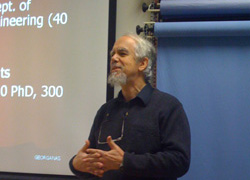IMDEA Networks

«Nuestros estudiantes realizan operaciones virtuales de cataratas»
06 Mayo 2009

El experto en realidad virtual cerró en Ikerlan su periplo por centros de investigación.
Ha llenado el salón de grados de la Facultad de Informática y ha recorrido con satisfacción centros tecnológicos guipuzcoanos como CEIT, Vicontech e Ikerlan. «Se están haciendo trabajos muy importantes en el País Vasco», asegura. El ingeniero Nicolas D. Georganas, profesor e investigador de la Universidad de Ottawa, afirma que los avances en realidad virtual conectarán muchas especialidades.
¿Cuál es la aplicación más sorprendente de la realidad virtual?
Llevamos 20 años utilizando la realidad virtual en los juegos. Pero más recientemente hemos empezado a usarla para aplicaciones industriales. Por ejemplo, en el aprendizaje. Con las simulaciones se evitan accidentes de trabajo. También los estudiantes pueden hacer prácticas. especialmente los de Medicina y Enfermería.
Los estudiantes de Medicina y Enfermería en la Universidad de Ottawa aprenden a operar de cataratas en realidad virtual. ¿Un gran paso adelante?
La tecnología está permitiendo evitar las prácticas con animales o incluso con los pacientes, como a veces ocurre. Los dispositivos hápticos permiten que el estudiante sienta, por ejemplo, la fuerza que realiza el profesor de medicina en la operación, aunque esté a muchos kilómetros de distancia.
Parece magia.
Los sistemas hápticos son poco conocidos y no están desarrollados masivamente, pero están presentes en la vida cotidiana. Por ejemplo, en el vibrador de los teléfonos móviles.
La realidad virtual no nos aporta sensaciones tactiles de dureza o rugosidad. ¿Llegará?
La transmisión es la revolución. Los sistemas hápticos existían hace diez años. Es una teleoperación o en telerrobótica los sistemas vienen de la ingeniería mecánica y de la electrónica. He visto trabajos muy interesantes en la Universidad del País Vasco y en los centros guipuzcoanos CEIT, Ikerlan o Vicontech que he visitado.
Uno de sus proyectos ha sido la predicción informática de incidentes en multitudes.
Es un proyecto de seguridad. Los sensores captan gestos y modos de andar. Personas con experiencia en estas cuestiones pueden tomar después una decisión. Eso no lo puede hacer la tecnología.
¿Cómo deben adaptarse las facultades de Informática al reto de Bolonia?
La convergencia universitaria europea es algo estupendo. Va a permitir el intercambio de alumnos y profesores. Facilitará el conocimiento de los programas de las diferentes instituciones y los diferentes países.
Con el avance de la realidad virtual, ¿terminaremos confundiendo molinos con gigantes?
Hay problemas importantes que necesitan la participación de colegas universitarios de Psicología y Sociología. Es habitual que estos expertos trabajen con los informáticos y los ingenieros para evaluar los efectos de la tecnología en el ser humano. No conocemos sus efectos.
TRAYECTORIA
Es investigador visitante en IMDEA Networks, cátedra de excelencia de la Universidad Carlos III de Madrid y Doctor Honoris Causa por universidades de Grecia y Alemania. Ha sido vicerrector de Investigación de la Universidad de Ottawa y posee el ‘Killam Prize for Engineering’, el máximo galardón canadiense en materia de investigación.
Leer más:
- Enlace a publicación en los medios: diariovasco.com


Comentarios recientes